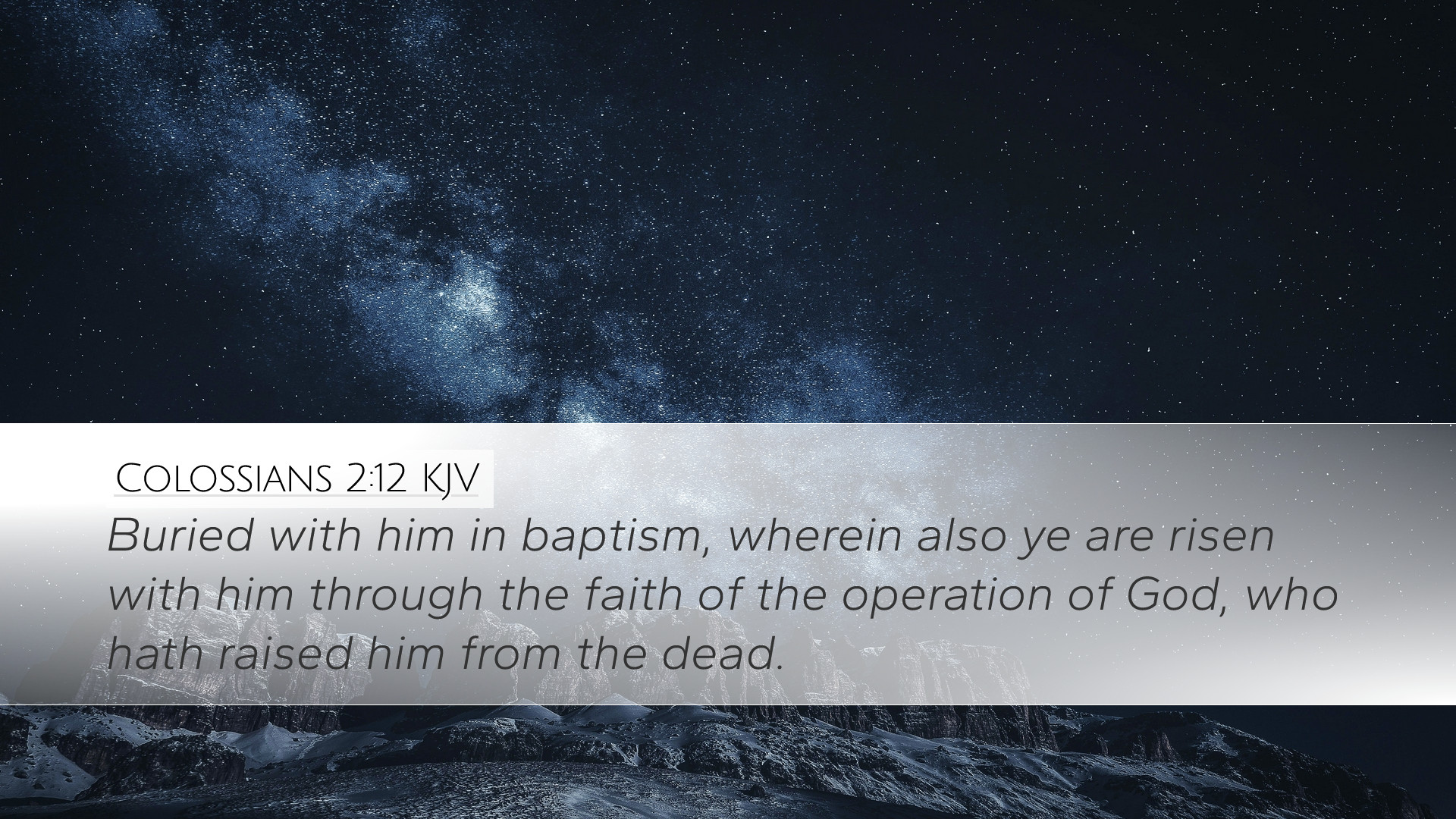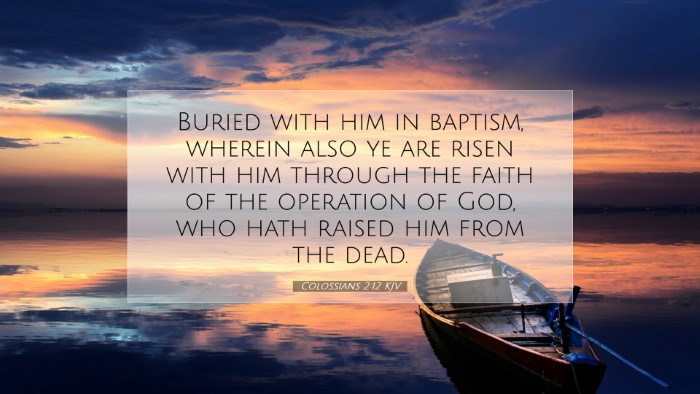Commentary on Colossians 2:12
Colossians 2:12 states, "Buried with Him in baptism, in which you were also raised with Him through faith in the working of God, who raised Him from the dead." This verse encapsulates the profound theological truths of the death, burial, and resurrection of Christ and its implications for believers.
Context and Background
To fully appreciate this verse, it is critical to understand its context within the epistle to the Colossians. The Apostle Paul writes to the church in Colossae to counteract false teachings that were undermining the sufficiency of Christ. In the preceding verses, Paul emphasizes the believer’s union with Christ and the spiritual fullness found in Him, paving the way for the climactic declaration in verse 12.
Buried with Him in Baptism
This phrase signifies the believer's identification with Christ in His death. Matthew Henry notes, "Baptism represents the death of the old man, the flesh; it signifies the believer's burial with Christ, as the body is buried in water." This imagery speaks to the profound transformation that occurs at salvation—marking the end of an old life characterized by sin.
Albert Barnes adds, "The act of baptism is a public declaration of faith, illustrating the believer's entrance into the new covenant, thus participating in Christ's redemptive work." Baptism symbolizes both death to sin and the believer's faith in the resurrection power of God.
Raised with Him
Following the imagery of burial is the exhilarating truth of resurrection: "...in which you were also raised with Him..." This underscores the belief that through faith, believers not only die with Christ but also experience new life through Him. Adam Clarke highlights, "This raising brings the believer into a new state of resurrection life, a transformation that enables them to walk in newness of life."
This duality of dying and rising signifies participation in Christ’s victory over sin and death. Paul’s use of the passive voice here implies that the resurrection is entirely the work of God, affirming that believers are recipients of divine grace and power.
Through Faith in the Working of God
The phrase emphasizes that this miraculous transformation is activated by faith. Matthew Henry asserts, "Faith is the means by which the resurrection power of God is applied to the believer. It is not through human effort or merit; it is solely by the grace of God."
Albert Barnes brings attention to the workings of God, stating, "The believer's assurance in God's ability to raise them is foundational; their faith rests in God's sovereign power, not merely in theological knowledge." This deepens one’s understanding of faith as being relational and experiential—a living trust in God’s work.
The Resurrection of Christ
Paul ties the believer’s experience directly to the resurrection of Christ, emphasizing that the same power that raised Jesus from the dead is at work in the believer. Adam Clarke notes, "The resurrection of Christ is the assurance of our own resurrection; it fortifies the faith of the believer, giving them hope beyond the grave." This assurance is vital for sustaining believers amid trials and persecutions.
Theological Implications
The implications of this verse for practical theology cannot be overstated. It fundamentally redefines how a believer views their life post-conversion. The old self is buried; the new self rises to walk in obedience, empowered by the Holy Spirit. Matthew Henry summarizes, "The life of a Christian ought to reflect the death and resurrection of Christ. Their actions, mentality, and relationships should embody the transformative aspects of grace."
Application for Believers
For pastors, theologians, and students, Colossians 2:12 serves as a reminder of the commitment to discipleship. It challenges adherents to reflect on their baptismal vows and the commitment to live a life that mirrors Christ’s resurrection. Albert Barnes suggests practical experiences:
- Live Victoriously: Understanding that we are raised with Christ should empower believers to live with confidence and joy, overcoming sin and despair.
- Fellowship in Suffering: Just as Christ suffered and died, believers should embrace trials as part of their journey, knowing they are united with Him.
- Commit to Holiness: Recognizing the price paid for their resurrection, believers are called to pursue holiness and righteousness as a living expression of their new life in Christ.
Conclusion
Colossians 2:12 profoundly illustrates the core message of the Gospel—the believer's union with Christ in His death and resurrection. It encompasses the transformative power of God that works through faith, invoking a life characterized by resurrection power. Pastors and scholars alike must interpret this verse as both a theological foundation and an exhortation to live out the reality of new life in Christ.


